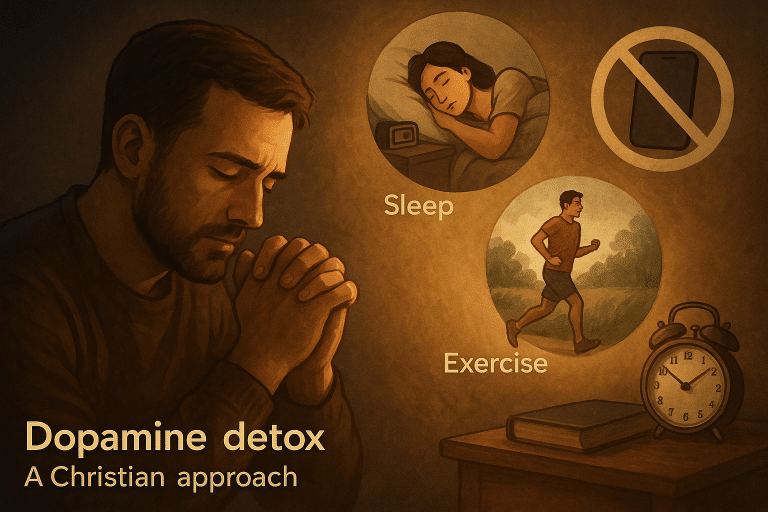Faith and Fear Calming Your Mind: A Christian Guide
Estimated reading time: 6 minutes
Introduction: Faith and Fear Calming Your Mind
Fear touches every home, yet God invites us to act with courage. In simple terms, the Christian life holds together faith and fear; calming your mind requires training both heart and body. Therefore, this guide explains how Scripture, neuroscience, and wise care work together. Moreover, we use evidence and compassionate practice so everyday believers can act today. As a result, you will see how prayer, breathing, therapy, and community reinforce one another.
Above all, you will learn to notice fear quickly and then anchor attention in God’s presence. Consequently, you can take practical steps, build new reactions, and recover hope. Finally, we ground these steps in research on anxiety and in real stories of change. For Bible-centered next steps, explore our biblical guidance for anxiety. For a clinical overview of symptoms and treatment, review the NAMI anxiety disorders guide. In short, faith and fear calming your mind is realistic because God is near and because He formed your nervous system to be soothed through trust and wise habits.
How Fear Works: Body, Brain, and Appraisal
Fear begins as a God‑given alarm. However, when the alarm stays on, the body pays a cost. As a result, the sympathetic system speeds heart rate, tenses muscles, and narrows attention. Meanwhile, the parasympathetic system restores calm through slow breathing and safety cues. Therefore, skills that lengthen the exhale, relax the jaw, and soften the gaze signal safety. Furthermore, your prefrontal cortex regains control when the amygdala settles.
In addition, naming the fear out loud reduces its intensity because language reshapes threat appraisal. Likewise, focusing on what you can do next turns panic into problem solving. For example, you can step outside, breathe in a four‑seven‑eight pattern, and pray Psalm 56:3. Moreover, you can text a friend for prayer and decide the next right small action. For a concise science primer, see the ADAA overview of anxiety. Consequently, these body cues explain how practical habits support faith and fear calming your mind.
Christian Anxiety Relief: Habits That Train a Calm Mind
Start with prayer that includes thanksgiving, because gratitude interrupts rumination. Additionally, pray honestly about specific fears and release them into God’s hands. Moreover, meditate on short Scriptures; repeat them slowly to crowd out catastrophic thoughts. Consequently, the brain learns a new default under pressure. For instance, say, “When I am afraid, I will trust in You,” and pair the verse with a calm breath. Furthermore, journal each evening to notice triggers and to record God’s care. In addition, meet weekly with a mature believer for encouragement and accountability. Likewise, keep sabbath moments in your week so busyness does not steal recovery. Above all, practice forgiveness; resentment keeps the body in a fight‑or‑flight posture. For supporting research, see Koenig’s review of faith and health in ISRN Psychiatry.
All in all, these biblical meditation peace practices build Christian mental calm one choice at a time. Additionally, learn structured breathwork with our deep breathing exercises, and strengthen your dialogue with God using our prayer for anxiety guide. Moreover, keep a list of Bible verses for anxiety nearby so truth is ready when fear rises. For evidence that forgiveness and gratitude improve mental health, review Harvard’s summary, Not Just Good for the Soul.

Wise Care: Therapy and Medicine with Faith
Sometimes anxiety becomes a disorder that deserves clinical help. Therefore, consider cognitive behavioral therapy to challenge distorted thoughts and face avoided situations safely; see outcomes data from the Society of Clinical Psychology (CBT outcomes in anxiety). Additionally, ask your physician about medication when symptoms block daily life; medicines can lower the body’s alarm while you learn skills. Moreover, a plan that blends therapy, community support, and prayer respects the whole person. For a treatment overview, consult the NAMI clinical guidance.
For example, some believers use an SSRI to steady mood and then practice exposure tasks with a counselor. Likewise, they memorize Philippians 4:6‑7 and apply it before sleep. As a result, guilt fades and function improves. Furthermore, invite trusted friends to check in; accountability strengthens follow‑through. Additionally, clarify follow‑up appointments so momentum continues. Evidence consistently shows that healthy spiritual practices correlate with lower anxiety (Koenig 2012 review), and that practical disciplines such as gratitude and forgiveness help (Harvard Health). For more foundations, see our internal primer on anxiety and biblical guidance.
Calm in Christ: Tools & Resources
Thoughtful tools can support your plan while you root peace more deeply in Christ. Additionally, a reliable study Bible and a journaling Bible make Scripture meditation easier. Moreover, a quiet devotional space improves follow‑through because cues trigger routines. Therefore, consider simple resources that help you pray, breathe, and rest. For overall strategy, see our practical article on how to stop overthinking using biblical tools.
- ESV Study Bible for rich notes that focus your attention on truth. Get it on Amazon.
- NIV Journal the Word Bible to pair reading with reflective note‑taking. Get it on Amazon.
- Weighted blanket to provide gentle pressure that may reduce nighttime arousal. Get it on Amazon.
- LectroFan white‑noise machine to muffle intrusive sounds and support deep rest. Get it on Amazon.
- Guided prayer journal to track requests, gratitude, and answered prayer. Get it on Amazon.
For example, a weighted blanket may calm the body at night by adding gentle pressure. Likewise, a white‑noise machine can soften intrusive sounds, while a journal captures prayers and progress. In addition, set a small timer to guide five minutes of Scripture meditation and slow breathing. Altogether, these concrete tools assist christian anxiety relief without replacing faith.

Conclusion: Faith Over Fear Mindset
Faith grows as you practice it under pressure. Therefore, greet each spike of worry as a cue to return to God and to your plan. Moreover, repeat the steps until they feel natural: pray, breathe, reframe, and re‑engage. In addition, celebrate small wins; momentum builds confidence. Consequently, over weeks the nervous system shifts from constant alert to calm in Christ. Likewise, your relationships feel safer as you communicate needs clearly.
Above all, remember the promise of God’s nearness; He has not abandoned you. For further skill building, visit our resources on prayer for anxiety and Christian meditation. In short, these habits make faith and fear calming your mind a daily reality. For a short research summary on faith practices and lower anxiety, read this peer‑reviewed overview of religion and mental health (Koenig 2012).






